大一上学期2011年听力考试材料
- 格式:doc
- 大小:24.50 KB
- 文档页数:2
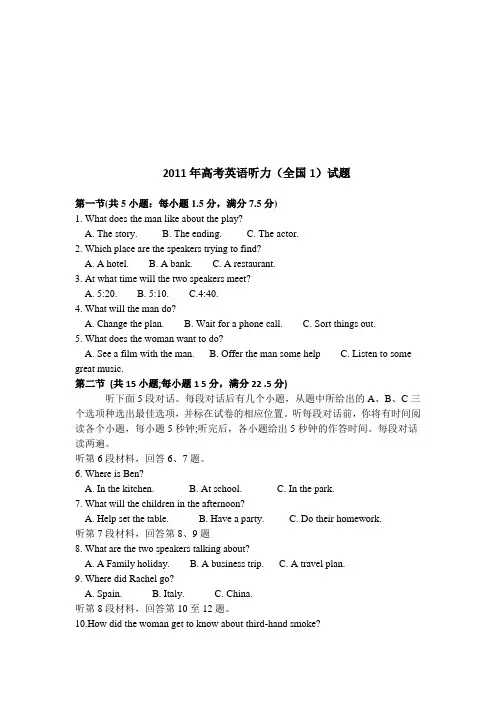
2011年高考英语听力(全国1)试题第一节(共5小题:每小题1.5分,满分7.5分)1. What does the man like about the play?A. The story.B. The ending.C. The actor.2. Which place are the speakers trying to find?A. A hotel.B. A bank.C. A restaurant.3. At what time will the two speakers meet?A. 5:20.B. 5:10.C.4:40.4. What will the man do?A. Change the plan.B. Wait for a phone call.C. Sort things out.5. What does the woman want to do?A. See a film with the man.B. Offer the man some helpC. Listen to some great music.第二节(共15小题;每小题1 5分,满分22 .5分)听下面5段对话。
每段对话后有几个小题,从题中所给出的A、B、C三个选项种选出最佳选项,并标在试卷的相应位置。
听每段对话前,你将有时间阅读各个小题,每小题5秒钟;听完后,各小题给出5秒钟的作答时间。
每段对话读两遍。
听第6段材料,回答6、7题。
6. Where is Ben?A. In the kitchen.B. At school.C. In the park.7. What will the children in the afternoon?A. Help set the table.B. Have a party.C. Do their homework.听第7段材料,回答第8、9题8. What are the two speakers talking about?A. A Family holiday.B. A business trip.C. A travel plan.9. Where did Rachel go?A. Spain.B. Italy.C. China.听第8段材料,回答第10至12题。
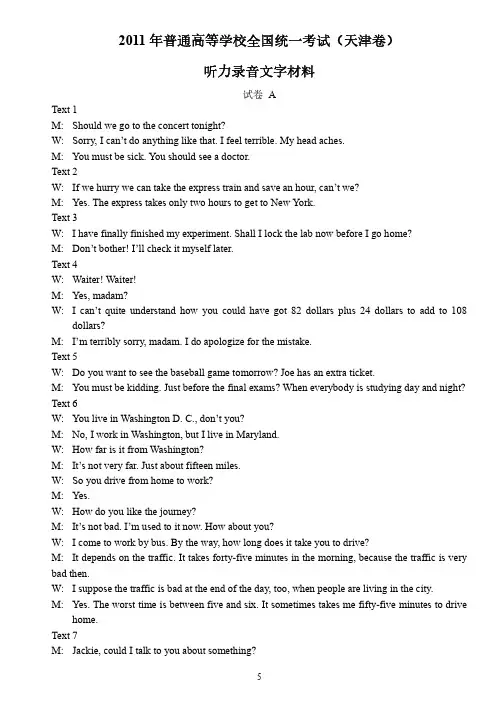
2011年普通高等学校全国统一考试(天津卷)听力录音文字材料试卷AText 1M: Should we go to the concert tonight?W: Sorry, I can’t do anything like that. I feel terrible. My head aches.M: You must be sick. You should see a doctor.Text 2W: If we hurry we can take the express train and save an hour, can’t we?M: Yes. The express takes only two hours to get to New York.Text 3W: I have finally finished my experiment. Shall I lock the lab now before I go home?M: Don’t bother! I’ll check it myself later.Text 4W: Waiter! Waiter!M: Yes, madam?W: I can’t quite understand how you could have got 82 dollars plus 24 dollars to add to 108 dollars?M: I’m terribly sorry, madam. I do apologize for the mistake.Text 5W: Do you want to see the baseball game tomorrow? Joe has an extra ticket.M: You must be kidding. Just before the final exams? When everybody is studying day and night? Text 6W: You live in Washington D. C., don’t you?M: No, I work in Washington, but I live in Maryland.W: How far is it from Washington?M: It’s not very far. Just about fifteen miles.W: So you drive from home to work?M: Yes.W: How do you like the journey?M: It’s not bad. I’m used to it now. How about you?W: I come to work by bus. By the way, how long does it take you to drive?M: It depends on the traffic. It takes forty-five minutes in the morning, because the traffic is very bad then.W: I suppose the traffic is bad at the end of the day, too, when people are living in the city.M: Yes. The worst time is between five and six. It sometimes takes me fifty-five minutes to drive home.Text 7M: Jackie, could I talk to you about something?W: Sure. What’s on your mind?M: There’s an opportunity to work part-time at a TV station. I was thinking of applying for it. W: Sounds good, but I’m afraid that it will affect your study.M: Don’t worry. I only work part time on weekends.W: Does it pay well?M: Actually no, but I want the experience---the chance to work in television. And, you know, my dream job is to be a play writer at a TV station.W: OK, then go for it.M: But I’ve heard many students are also interested in it. There will be an interview for those who apply for it, and I guess the competition would be very fierce.W: Well, I can help you prepare the interview, as I have some successful experience.M: Wonderful! Thank you so much!Text 8Welcome to College of Higher Education. Today I’ll talk about some services offered by the college.All student services are to be found in the North Building. Social life is run by the Student Union. All students are automatically members of it. After registration, take your receipt to the Student Union and they will give you your student card. With the card, you will become a member of the Student Club.The Student Union will give you a handbook which gives more details on all the services offered plus more information on the health services, accommodation and so on.Let’s talk about medical services first. The college has a student health center. The center is open from 9:30 a.m. to 8:45 p.m. Monday to Thursday, and from 9:30 a.m. to 2:00 p.m. on Fridays. The college doctor, Dr. Smith, works in the center three days a week. On other days Dr. Smith can be found at her office. Next, we’ll... (fading)试卷BText 1M: This is the last year of our college life, Mary. Are your classes difficult?W: No, not really. I’m just taking two classes this term.M: You’re lucky. My classes are difficult.Text 2M: Why isn’t Alice here yet? We agreed to meet at 10:30. It’s almost 11:00. Should we call her or go look for her?W: Maybe there’s a traffic jam. Let’s give her a few more minutes.Text 3M: Where’s Tony?W: Oh, he’s home at his computer. He can’t come with us because his research paper is due tomorrow.Text 4M: Good afternoon. I’m phoning about the position advertised in this morning’s paper.W: Oh, yes, I’ll put you through to the manager.Text 5W: What are you doing here? I thought you were on a trip?M: I didn’t go because I had second thoughts about spending all that money.Text 6W: I’m writing an article about college life. Would you mind if I ask you a few questions about your life in this university?M: Not at all.W: Good. Are you a second year student?M: No, I’ve just studied my third year.W: Do you live on campus?M: No. Not any more. But I lived on campus for the first two years. I lived in the student halls. W: Are you part of any clubs or societies this year?M: Yes. I’ve been in the basketball club since I came here. We practice every week and have matches on Wednesdays. And I am in the French club, too.W: What does the French club do?M: Well, we meet, talking in French, watching French movies and things like that.W: Sounds interesting. Thanks for your time.Text 7W: Hey Joe, I’ve been looking for you. Are you free tonight?M: Yeah, I guess so. Why?W: My mother and my little brother are in town, and my mom bought these theatre tickets months ago and…M: What show?W: It’s a play by Shakespeare and…M: Don’t say another word. I’d love to go…W: Uh… I don’t know how to tell you this, but I’m actually going with my mother. And I was wondering if you could look after my little brother while we’re away.M: Ah. How embarrassing! Oh, sure, no problem. What time should I show up?W: Seven o’clock at my place. He won’t be any trouble. You can just watch a video with him or something. Uh, Joe, I’m really sorry about misunderstanding…M: Don’t worry. Actually I think it’s kind of funny. See you at seven.Text 8Hi! I’m Sophie. Do you want to know what we’re doing these days? Well, we’re college students and we’re volunteering at a primary school. We’re working hard collecting supplies for an emergency drill. We’ve decided that I should be the boss because I’m the oldest. That’s fine with me because I kind of like telling everyone what to do.Anyway, you can see that this is a lot of work. But that’s OK. Three of us are doing the work, so we’ll probably be finished in a day or two. When we started we had no idea about what supplies to get. But we looked on the Internet and found a website with a lot of information about what to do before, during, and after an emergency.Yesterday, two of us went shopping for canned food, bottled water, flashlights, batteries and blankets at a discount store. It was so crowded. It made me crazy because I don’t have a lot of free time. But we got almost everything we needed. And the teachers and parents are happy to have our help.参考答案A卷:1-5 CBAAC 6-10 BACBC 11-15 ABCACB卷:1-5 ABCAC 6-10 CBABA 11-15 BBACA。
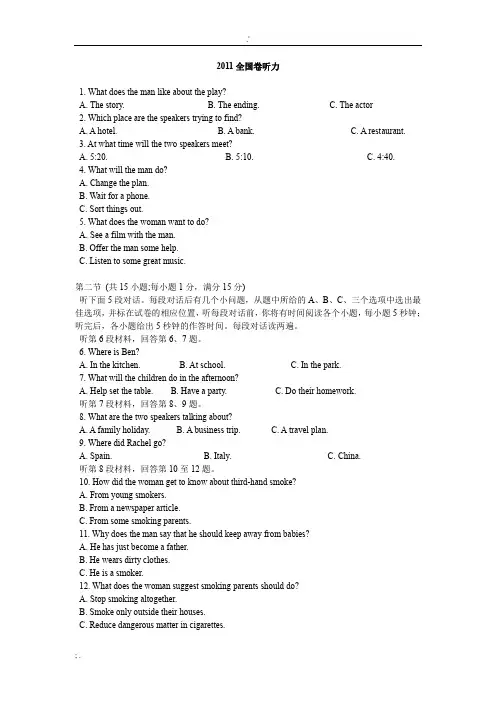
2011全国卷听力1. What does the man like about the play?A. The story.B. The ending.C. The actor2. Which place are the speakers trying to find?A. A hotel.B. A bank.C. A restaurant.3. At what time will the two speakers meet?A. 5:20.B. 5:10.C. 4:40.4. What will the man do?A. Change the plan.B. Wait for a phone.C. Sort things out.5. What does the woman want to do?A. See a film with the man.B. Offer the man some help.C. Listen to some great music.第二节(共15小题;每小题1分,满分15分)听下面5段对话。
每段对话后有几个小问题,从题中所给的A、B、C、三个选项中选出最佳选项,并标在试卷的相应位置,听每段对话前,你将有时间阅读各个小题,每小题5秒钟;听完后,各小题给出5秒钟的作答时间。
每段对话读两遍。
听第6段材料,回答第6、7题。
6. Where is Ben?A. In the kitchen.B. At school.C. In the park.7. What will the children do in the afternoon?A. Help set the table.B. Have a party.C. Do their homework.听第7段材料,回答第8、9题。
8. What are the two speakers talking about?A. A family holiday.B. A business trip.C. A travel plan.9. Where did Rachel go?A. Spain.B. Italy.C. China.听第8段材料,回答第10至12题。
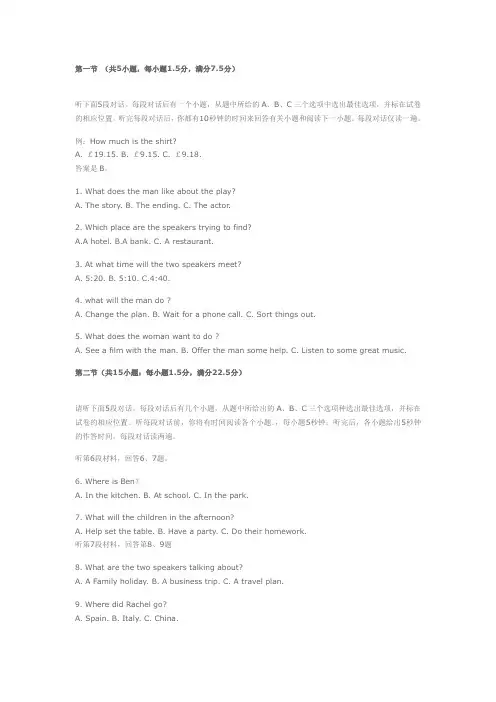
第一节(共5小题,每小题1.5分,满分7.5分)听下面5段对话。
每段对话后有一个小题,从题中所给的A、B、C三个选项中选出最佳选项,并标在试卷的相应位置。
听完每段对话后,你都有10秒钟的时间来回答有关小题和阅读下一小题。
每段对话仅读一遍。
例:How much is the shirt?A. £19.15.B. £9.15.C. £9.18.答案是B。
1. What does the man like about the play?A. The story.B. The ending.C. The actor.2. Which place are the speakers trying to find?A.A hotel.B.A bank.C. A restaurant.3. At what time will the two speakers meet?A. 5:20.B. 5:10.C.4:40.4. what will the man do ?A. Change the plan.B. Wait for a phone call.C. Sort things out.5. What does the woman want to do ?A. See a film with the man.B. Offer the man some help.C. Listen to some great music.第二节(共15小题:每小题1.5分,满分22.5分)请听下面5段对话。
每段对话后有几个小题,从题中所给出的A、B、C三个选项种选出最佳选项,并标在试卷的相应位置。
听每段对话前,你将有时间阅读各个小题。
,每小题5秒钟;听完后,各小题给出5秒钟的作答时间。
每段对话读两遍。
听第6段材料,回答6、7题。
6. Where is Ben?A. In the kitchen.B. At school.C. In the park.7. What will the children in the afternoon?A. Help set the table.B. Have a party.C. Do their homework.听第7段材料,回答第8、9题8. What are the two speakers talking about?A. A Family holiday.B. A business trip.C. A travel plan.9. Where did Rachel go?A. Spain.B. Italy.C. China.听第8段材料,回答第10至12题。
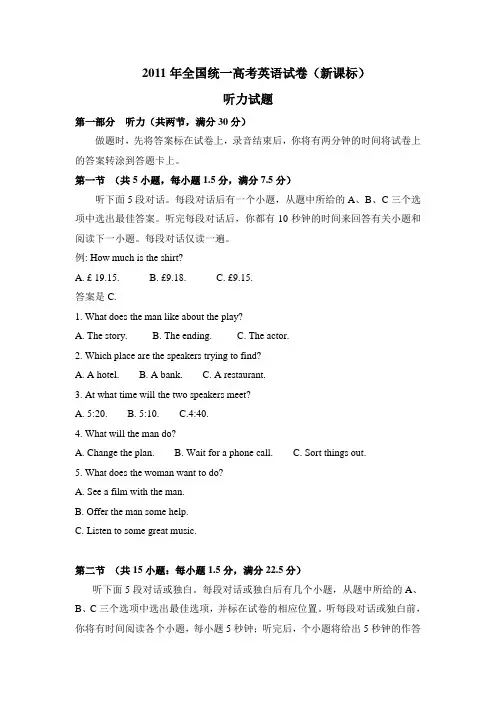
2011年全国统一高考英语试卷(新课标)听力试题第一部分听力(共两节,满分30分)做题时,先将答案标在试卷上,录音结束后,你将有两分钟的时间将试卷上的答案转涂到答题卡上。
第一节(共5小题,每小题1.5分,满分7.5分)听下面5段对话。
每段对话后有一个小题,从题中所给的A、B、C三个选项中选出最佳答案。
听完每段对话后,你都有10秒钟的时间来回答有关小题和阅读下一小题。
每段对话仅读一遍。
例: How much is the shirt?A. £ 19.15.B. £9.18.C. £9.15.答案是C.1. What does the man like about the play?A. The story.B. The ending.C. The actor.2. Which place are the speakers trying to find?A. A hotel.B. A bank.C. A restaurant.3. At what time will the two speakers meet?A. 5:20.B. 5:10.C.4:40.4. What will the man do?A. Change the plan.B. Wait for a phone call.C. Sort things out.5. What does the woman want to do?A. See a film with the man.B. Offer the man some help.C. Listen to some great music.第二节(共15小题:每小题1.5分,满分22.5分)听下面5段对话或独白。
每段对话或独白后有几个小题,从题中所给的A、B、C三个选项中选出最佳选项,并标在试卷的相应位置。
听每段对话或独白前,你将有时间阅读各个小题,每小题5秒钟;听完后,个小题将给出5秒钟的作答时间。
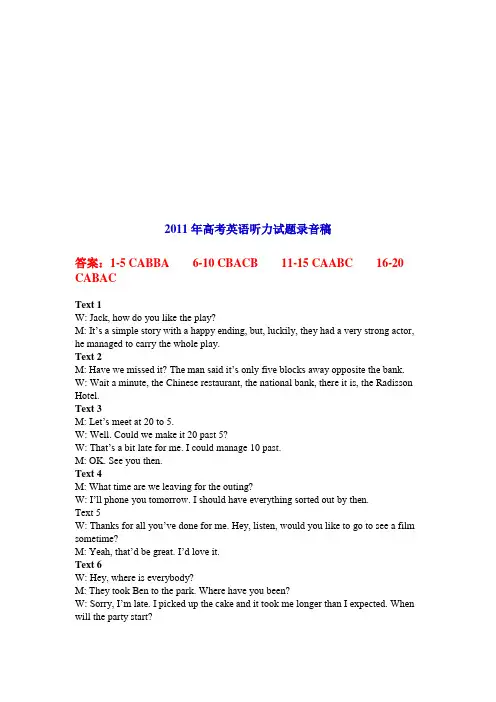
2011年高考英语听力试题录音稿答案:1-5 CABBA 6-10 CBACB 11-15 CAABC 16-20 CABACText 1W: Jack, how do you like the play?M: It’s a simple story with a happy ending, but, luckily, they had a very strong actor, he managed to carry the whole play.Text 2M: Have we missed it? The man said it’s only five blocks away opposite the bank. W: Wait a minute, the Chinese restaurant, the national bank, there it is, the Radisson Hotel.Text 3M: Let’s meet at 20 to 5.W: Well. Could we make it 20 past 5?W: That’s a bit late for me. I could manage 10 past.M: OK. See you then.Text 4M: What time are we leaving for the outing?W: I’ll phone you tomorrow. I should have everything sorted out by then.Text 5W: Thanks for all you’ve done for me. Hey, listen, would you li ke to go to see a film sometime?M: Yeah, that’d be great. I’d love it.Text 6W: Hey, where is everybody?M: They took Ben to the park. Where have you been?W: Sorry, I’m late. I picked up the cake and it took me longer than I expected. When will the party start?M: Ben invited eight children from school. And they’ll arrive at about 2 in the afternoon.W: OK. Then I’ll put the candles on the cake and leave it in the kitchen and then I’ll come and help set the table.Text 7M: So, Macy, how was your holiday?W: Oh, we loved it. Tom liked Germany best, but France was my favorite.M: So did Rachael finally go with you?W: No, she wasn’t able to. She was called away for a business trip to China.M: That’s a pity. So where exactly did you go and visit?W: Well, we traveled all over, Italy, Spain and Holland; we even bathed in a Swiss lakeM: You did, really?Text 8W: Bob, I’m sure you know about second-hand smoke.M: Of course, I do.W: But have you heard about third-hand smoke?M: Third-hand smoke? I’m afraid n ot. What is that then?W: Well, it is here in today’s paper. Parents may think they are protecting children from second-hand smoke when they smoke outside their home or only when the children are not there. But now researchers are warning about what they callthird-hand smoke. When you smoke dangerous matter from cigarettes get into your hair and clothing. As babies are the weakest, when you come to a baby, you pass it to the baby and increase the chances of disease in the baby.M: Is that so? In that case I have to say that I should never get close to a baby.W: That’s right. Actually all smoking parents should do the same or better give it up completely.Text 9M: Hello, welcome to our program “Today City”. I’m Larry. We’re going to Louisville Kentucky where our guest Michelle Ray comes from. She is proud of her middle-sized city with a small town feel and big city dreams. Now, Michelle, tell us about your city.W: Thank you, Larry. Here is my city. Louisville is my city. The first place I take visitors from out of town is to the Highlands for shopping and night life. When I have delicious Asian food I always go to the Zen Garden which provides wonderful all vegetable dishes.M: Wow, that’s interesting. Many people go for healthy food now.W: You can say that again. If I want to go camping and fishing, I go to the Red River area. For complete quiet I can hide away in my house with a good book from one of our public libraries.M: That all sounds very exciting. I’m sure some of our listeners will include Louisville in their travel plan for their next holiday. Thank you, Michelle.Text 10M: We are glad to have Dr. Garfield to talk to us today about dreams. Let me start by asking the first question. Does everyone dream?W: It appears that everyone does. Mostly when people say that they never dream, what they really mean is that they don’t remember their dreams or they don’t think their dreams are important. The reason behind is that they might have been made fun of with a child when they first reported their dreams or it was so frightening that they just turned off dreaming completely. The other day, someone named Davis came to me and said that he used to be a great dreamer, but suddenly he stopped having dreams. I asked him what it happened. It turned out that his brother died by heart attack and he never expected that such a terrible thing would happen to a young person. Generally, when there was some frightening event and dream about it was too terrible. People prefer not to dream about it. Actually the worst thing you can do is stop dreaming. Because it means that the bad experience would be too painful to even appear in dreams. As long as you dream about it and even the dream is frightening, your mind is working on it. My personal opinion about what dreams do is that they help us deal with our problems. We see certain patterns take place in dreams. When a person is hurt deep inside, when a person is seriously ill or when a person has been really sad, if people turn off their dreams totally, it means they don’t lo ve themselves to even think about it.。

2011年普通高等学校招生全国统一考试英 语 (听力部分)第一部分听力(共两节,满分30分)做题时,先将答案标在试卷上。
录音内容结束后,你将有两分钟的时间将试卷上的答案转涂到答题卡上。
高考英语听力试音部分原稿M:Hello.International Friends Club.Can I help you?W:Oh.Hello.I read about your club in the paper today.And I thought I'd phone to find out a bit more.M:Yes,certainly.Well,We're a sort of social club for people from different countries.It's quite a new club.We have about 50 members at the moment.But we are growing all the time.W:That sounds interesting.I'm British actually.And I came to Washington about three months ago.I'm looking for ways to meet people.Ah,what kind of events do you organize?M:Well,we have social get_togethers and sports events and we also have language evenings.W:Could you tell me something about the language evening?M:Yes.Every day except Thursday we have a language evening.People can come and practise their language,you know,over a drink or something.We have different language on different evenings.Monday,Spanish;Tuesday,Italian,Wednesday,German;AndFriday,French.On Thursday,we usually have a meal in a restaurant for anyone who wants to come.W:Well,that sounds great.I really need to practise my French.M:Ok,well,if you can just give me your name and address,I'll send you the form and some more information.If you join now,you can have the first month free..第一节 (共5小题;每小题1.5分,满分7.5分)听下面5段对话。
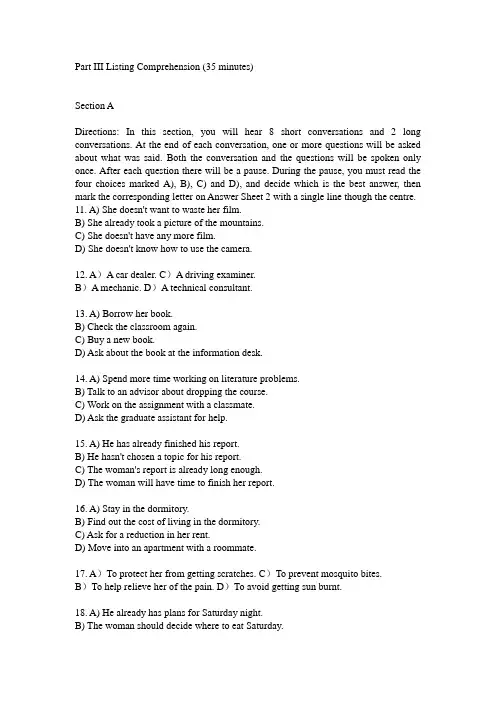
Part III Listing Comprehension (35 minutes)Section ADirections: In this section, you will hear 8 short conversations and 2 long conversations. At the end of each conversation, one or more questions will be asked about what was said. Both the conversation and the questions will be spoken only once. After each question there will be a pause. During the pause, you must read the four choices marked A), B), C) and D), and decide which is the best answer, then mark the corresponding letter on Answer Sheet 2 with a single line though the centre.11. A) She doesn't want to waste her film.B) She already took a picture of the mountains.C) She doesn't have any more film.D) She doesn't know how to use the camera.12. A)A car dealer. C)A driving examiner.B)A mechanic. D)A technical consultant.13. A) Borrow her book.B) Check the classroom again.C) Buy a new book.D) Ask about the book at the information desk.14. A) Spend more time working on literature problems.B) Talk to an advisor about dropping the course.C) Work on the assignment with a classmate.D) Ask the graduate assistant for help.15. A) He has already finished his report.B) He hasn't chosen a topic for his report.C) The woman's report is already long enough.D) The woman will have time to finish her report.16. A) Stay in the dormitory.B) Find out the cost of living in the dormitory.C) Ask for a reduction in her rent.D) Move into an apartment with a roommate.17. A)To protect her from getting scratches. C)To prevent mosquito bites.B)To help relieve her of the pain. D)To avoid getting sun burnt.18. A) He already has plans for Saturday night.B) The woman should decide where to eat Saturday.C) The woman should ask her brother for a suggestion.D) He will make a reservation at the restaurant.Section BQuestions 19 to 22 are based on the conversation you have just heard.19. A) In the student recreation center.B) In the campus canteen.C) In the university bookstore.D) In a classroom.20. A) Studying.B) Preparing snacks.C) Playing cards.D) Learning how to play bridge.21. A) Watch her partner.B) Play her cards in cooperation with her partner.C) Quit the game.D) Teach the man how to play bridge.22. A) He already knows how to play.B) He doesn't like to play games.C) He doesn't have a partner.D) He doesn't have enough free time.Questions 23 to 25 are based on the conversation you have just heard.23. A)It helps her to attract more public attention.B)It improves her chance of getting promoted.C)It strengthens her relationship with students.D)It enables her to understand people better.24. A)Passively. C)Skeptically.B)Positively. D)Sensitively.25. A)It keeps haunting her day and night.B)Her teaching was somewhat affected by it .C)It vanishes the moment she steps into her role.D)Her mind goes blank once she gets on the stage.Section BDirections: In this section, you will hear 3 short passages. At the end of each passage, you will hear some questions. Both the passage and the questions will be spoken only once. After you hear a question, you must choose the best answer from the four choices marked A), B), C) and D). Then mark the corresponding letter on the Answer Sheet 2 with a single line through the centre.Passage oneQuestions 26 to 29 are based on the passage you have just heard.26. A) Watch a slide show about trees.B) Learn how to prevent Dutch elm disease.C) Study the history of the campus buildings and grounds.D) Look at examples of trees on campus.27. A) History.B) Physical education.C) Botany.D) Architecture.28. A) Its leaves are yellow.B) Its leaves are lopsided.C) It is very tall.D) It is not an angiosperm.29.A) It has grown too tall for its designated space.30.B) It may be diseased.C) Its branches are being broken off.D) It no longer hears from.Passage twoQuestions 30 to 32 are based on the passage you have just heard.30. A) Jefferson's views about commercialized agriculture.B) International trade in the nineteenth centuryC) Improvements in farm machinery in the United States.D) Farmers' loss of independence31. A) Crop production became increasingly specialized.B) Economic depressions lowered the prices of farm products.C) New banking laws made it easy to buy farmland.D) The United States increased its agricultural imports.32. A) Prices for farm products rose.B) Farmers became more dependent on loans from banks.C) Jefferson established government programs to assist farmers.D) Farmers relied less on foreign markets.Passage threeQuestions 33 to 35 are based on the passage you have just heard.33. A) In place of physical therapy.B) To control brain seizures.C) To prevent heat disease.D) To relieve tension.34. A) They like to have music in the operating room.B) They solved problems better while listening to music they liked.C) They preferred classical music.D) They performed better when they used headphones.35. A) It increased the students’ white blood cell amount.B) It increased some students’ energy level.C) It improved the students’ ability to play musical instruments.D) It released a natural painkiller in some students’ bodies.Section CDirections: In this section, you will hear a passage three times. When the passage is read for the first time, you should listen carefully for its general idea. When the passage is read for the second time, you are required to fill in the blanks numbered from 36 to 43 with the exact words you have just heard. For blanks numbered from 44to 46 you are required to fill in the missing information. For these blanks, you can either use the exact words you have just heard or write down the main points in your own words. Finally, when the passage is read for the third time, you should check what you have written.Sleep is part of a person's daily __36__ cycle. There are several different stages of sleep and they occur in cycles, If you are an __37___ sleeper, your sleep cycle is as follows. When you first drift off into slumber, your eyes will roll about a bit, your _____38_____ will drop slightly, your ___39__ will relax, and your ___40____ will slow and become quite ____41____ Your brain waves slow down a bit too with the alpha rhythm of rather fast waves ____42____ for the first few minutes. This is called stage 1 sleep. For the next half hour or so as you relax more and more you will drift down through stage 2 and stage 3 sleep. The lower your stage of sleep the slower your brain waves will be. Then about 40 to 60 minutes after you lose _____43____ you will have reached the deepest sleep of all.________________________________________44___________________________ _______. This is stage 4 sleep.You do not remain at this deep fourth stage all night long, but instead about 80 minutes after you fall into slumber, your brain activity level will increase again slightly. The delta rhythm will disappear to be replaced by the activity pattern of brain waves._______________________________45______________________________.This period of rapid eye movement lasts for some ~ to 15 minutes and is called REM sleep. It is during REM sleep that most dreams seem to occur. ______________________46________________ .You will slip gently back from stage I to 4.11-18 CBDD DACB 19-22 BCAD23-25 DBC26-29 DCCB 30-32 DAB 33-35 DBD 36.activity37. average38. temperature39. muscles40. breathing41. regular42. Predominating 43.conciousness.44. Your brain waves will show the large slow waves that are known as the delta rhythm.45. Your eyes will begin to dart around under your closed eyelids as if you were looking at something occurring In front of you.46. Provided that you do not wake up during the first sleep period, your body will soon relax again, your breathing will grow slow and regular once more.。
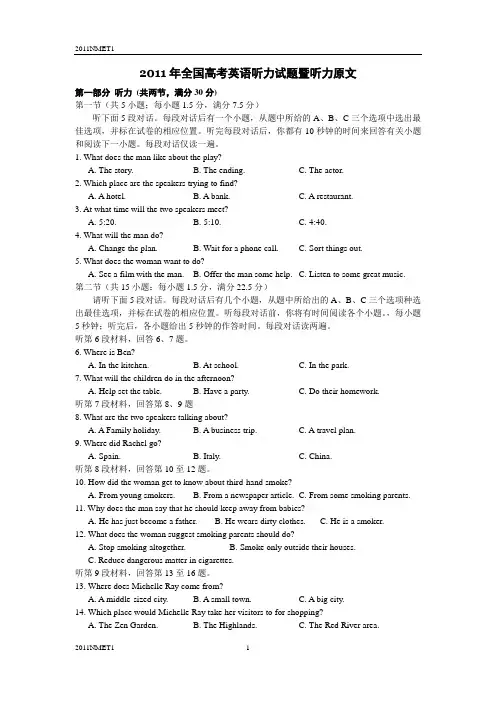
2011年全国高考英语听力试题暨听力原文第一部分听力(共两节,满分30分)第一节(共5小题;每小题1.5分,满分7.5分)听下面5段对话。
每段对话后有一个小题,从题中所给的A、B、C三个选项中选出最佳选项,并标在试卷的相应位置。
听完每段对话后,你都有10秒钟的时间来回答有关小题和阅读下一小题。
每段对话仅读一遍。
1. What does the man like about the play?A. The story.B. The ending.C. The actor.2. Which place are the speakers trying to find?A. A hotel.B. A bank.C. A restaurant.3. At what time will the two speakers meet?A. 5:20.B. 5:10.C. 4:40.4. What will the man do?A. Change the plan.B. Wait for a phone call.C. Sort things out.5. What does the woman want to do?A. See a film with the man.B. Offer the man some help.C. Listen to some great music.第二节(共15小题:每小题1.5分,满分22.5分)请听下面5段对话。
每段对话后有几个小题,从题中所给出的A、B、C三个选项种选出最佳选项,并标在试卷的相应位置。
听每段对话前,你将有时间阅读各个小题。
,每小题5秒钟;听完后,各小题给出5秒钟的作答时间。
每段对话读两遍。
听第6段材料,回答6、7题。
6. Where is Ben?A. In the kitchen.B. At school.C. In the park.7. What will the children do in the afternoon?A. Help set the table.B. Have a party.C. Do their homework.听第7段材料,回答第8、9题8. What are the two speakers talking about?A. A Family holiday.B. A business trip.C. A travel plan.9. Where did Rachel go?A. Spain.B. Italy.C. China.听第8段材料,回答第10至12题。
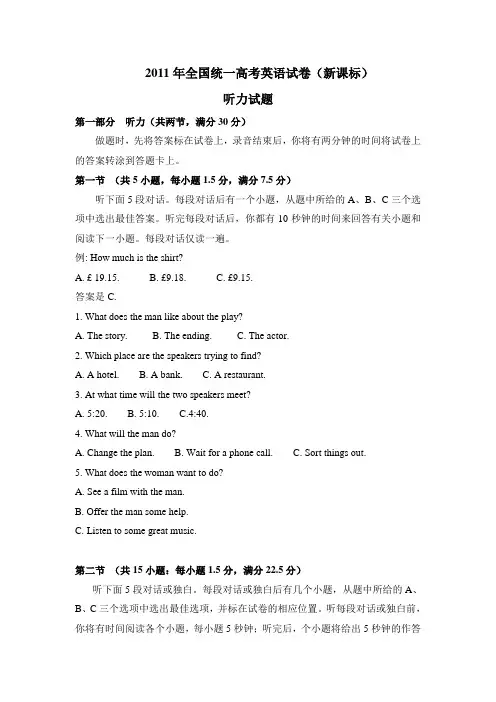
2011年全国统一高考英语试卷(新课标)听力试题第一部分听力(共两节,满分30分)做题时,先将答案标在试卷上,录音结束后,你将有两分钟的时间将试卷上的答案转涂到答题卡上。
第一节(共5小题,每小题1.5分,满分7.5分)听下面5段对话。
每段对话后有一个小题,从题中所给的A、B、C三个选项中选出最佳答案。
听完每段对话后,你都有10秒钟的时间来回答有关小题和阅读下一小题。
每段对话仅读一遍。
例: How much is the shirt?A. £ 19.15.B. £9.18.C. £9.15.答案是C.1. What does the man like about the play?A. The story.B. The ending.C. The actor.2. Which place are the speakers trying to find?A. A hotel.B. A bank.C. A restaurant.3. At what time will the two speakers meet?A. 5:20.B. 5:10.C.4:40.4. What will the man do?A. Change the plan.B. Wait for a phone call.C. Sort things out.5. What does the woman want to do?A. See a film with the man.B. Offer the man some help.C. Listen to some great music.第二节(共15小题:每小题1.5分,满分22.5分)听下面5段对话或独白。
每段对话或独白后有几个小题,从题中所给的A、B、C三个选项中选出最佳选项,并标在试卷的相应位置。
听每段对话或独白前,你将有时间阅读各个小题,每小题5秒钟;听完后,个小题将给出5秒钟的作答时间。
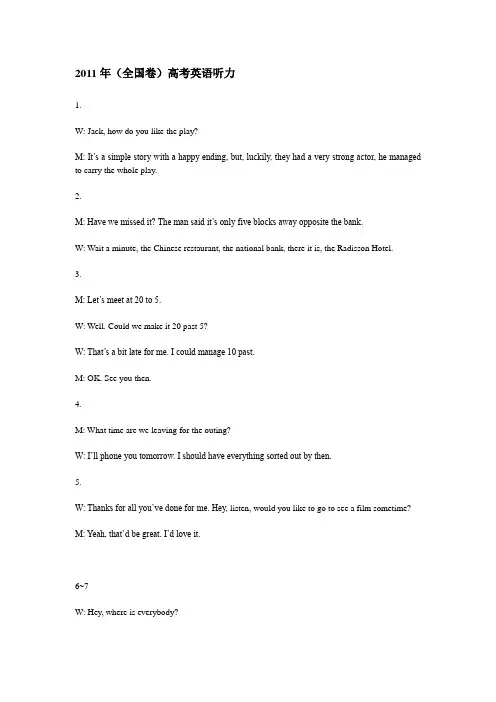
2011年(全国卷)高考英语听力1.W: Jack, how do you like the play?M: It’s a simple story with a happy ending, but, luckily, they had a very strong actor, he managed to carry the whole play.2.M: Have we missed it? The man said it’s only five blocks away opposite the bank.W: Wait a minute, the Chinese restaurant, the national bank, there it is, the Radisson Hotel.3.M: Let’s meet at 20 to 5.W: Well. Could we make it 20 past 5?W: That’s a bit late for me. I could manage 10 past.M: OK. See you then.4.M: What time are we leaving for the outing?W: I’ll phone you tomorrow. I should have everything sorted out by then.5.W: Thanks for all you’ve done for me. Hey, listen, would you like to go to see a film sometime?M: Yeah, that’d be great. I’d love it.6~7W: Hey, where is everybody?M: They took Ben to the park. Where have you been?W: Sorry, I’m late. I picked up the cake and it took me longer than I exp ected. When will the party start?M: Ben invited eight children from school. And they’ll arrive at about 2 in the afternoon.W: OK. Then I’ll put the candles on the cake and leave it in the kitchen and then I’ll come and help set the table.8~9M: So, Macy, how was your holiday?W: Oh, we loved it. Tom liked Germany best, but France was my favorite.M: So did Rachael finally go with you?W: No, she wasn’t able to. She was called away for a business trip to China.M: That’s a pity. So where exactly d id you go and visit?W: Well, we traveled all over, Italy, Spain and Holland; we even bathed in a Swiss lake.M: You did, really?10~12W: Bob, I’m sure you know about second-hand smoke.M: Of course, I do.W: But have you heard about third-hand smoke?M: Third-hand smoke? I’m afraid not. What is that then?W: Well, it is here in today’s paper. Parents may think they are protecting children from second-hand smoke when they smoke outside their home or only when the children are not there. But now researchers are warning about what they call third-hand smoke. When you smoke dangerous matter from cigarettes get into your hair and clothing. As babies are the weakest, when you come to a baby, you pass it to the baby and increase the chances of disease in the baby.M: Is that so? In that case I have to say that I should never get close to a baby.W: That’s right. Actually all smoking parents should do the same or better give it up completely.13~16M: Hello, welcome to our program “Today City”. I’m Larry. We’re going to Louisville Kentucky where our guest Michelle Ray comes from. She is proud of her middle-sized city with a small town feel and big city dreams. Now, Michelle, tell us about your city.W: Thank you, Larry. Here is my city. Louisville is my city. The first place I take visitors from out of town is to the Highlands for shopping and night life. When I have delicious Asian food I always go to the Zen Garden which provides wonderful all vegetable dishes.M: Wow, that’s interesting. Many people go for healthy food now.W: You can say that again. If I want to go camping and fishing, I go to the Red River area. For complete quiet I can hide away in my house with a good book from one of our public libraries.M: That all sounds very exciting. I’m s ure some of our listeners will include Louisville in their travel plan for their next holiday. Thank you, Michelle.17~20M: We are glad to have Dr. Garfield to talk to us today about dreams. Let me start by asking the first question. Does everyone dream?W: It appears that everyone does. Mostly when people say that they never dream, what they really mean is that they don’t remember their dreams or they don’t think their dreams are important. The reason behind is that they might have been made fun of with a child when they first reported their dreams or it was so frightening that they just turned off dreaming completely. The other day, someone named Davis came to me and said that he used to be a great dreamer, but suddenly he stopped having dreams. I asked him what it happened. It turned out that his brother died by heart attack and he never expected that such a terrible thing would happen to a young person. Generally, when there was some frightening event and dream about it was too terrible. People prefer not to dream about it. Actually the worst thing you can do is stop dreaming. Because it means that the bad experience would be too painful to even appear in dreams. As long as you dream about it and even the dream is frightening, your mind is working on it. My personal opinion about what dreams do is that they help us deal with our problems. We see certain patterns take place in dreams. When a person is hurt deep inside, when a person is seriously ill or when a person has been really sad, if people turn off their dreams totally, it means they don’t love themselves to even think about it。
第 1 大题的提示语:Section A.Directions: In section A, you will hear ten short conversations between two speakers. At the end of each conversation, a question will be asked about what was said. The conversations and the questions will be spoken only once. After you hear a conversation and the question about it, read the four possible answers on your paper, and decide which one is the best answer to the question you have heard.的听力原文:第1段听力材料1. It’s nice of you to come here to pick me up, Mr. Smith.Don’t m ention it. How was the flight?Where does the conversation most probably take place?本段听力材料的问题:第2段听力材料2. I wonder if there is a service charge for our meal.I think so. The menu says the service charge is 10 percent.How much is the service charge if the food costs 50 dollars?本段听力材料的问题:第3段听力材料3. Here is your room key and the check out time is 12 noon.Thank you for reminding me.What is the probable relationship between the two speakers?本段听力材料的问题:第4段听力材料4. Sorry, sir, we are working on your order now and will be delivering it soon.Soon? How soon is soon?How does the man feel?本段听力材料的问题:第5段听力材料5. Hi, Jane, it’s been ages. You haven’t changed a bit.Except for the hair.What does the woman mean?本段听力材料的问题:第6段听力材料6. Ok, Matthew, time for bed.Mom, the Talent Show is starting in 5 minutes.what does the man mean?本段听力材料的问题:第7段听力材料7. Hi, Janny, how are you getting on with your packing.I am still deciding what to take with me.What can we learn about Janny?本段听力材料的问题:第8段听力材料8. Everybody is here except John. Shall we start the meeting?If we wait for John, we might be here all night.What does the woman mean?本段听力材料的问题:第9段听力材料9. I am glad to find you are moving.I can’t tell you how happy I am. I won’t have to listen to my neighbour’s TV. What can we learn about the woman?本段听力材料的问题:第10段听力材料10. We left the road map home.Since we haven’t gone very far, we might just as well turn around.What might the speakers do?本段听力材料的问题:第 2 大题的提示语:Section B.Directions: In section B, you will hear two short passages, and you will be asked three questions on each of the passages. The passages will be read twice, but the questions will be spoken only once. When you hear a question, read the four possible answers on your paper and decide which one would be the best answer to the question you have heard.Questions 11 through 13 are based on the following passage.的听力原文:第11段听力材料The Commonwealth is a group of 54 countries. The member states all use English as a common working language, and have similar legal and education systems but represent nearly every religion, race and political system on the planet. The Commonwealth is active in a huge number of areas such as health and economics. The Heads of Government Meeting is held every two years, where the leaders of the member states get together to discuss current issues. Commonwealth Day is held in the second week of March every year, when Commonwealth citizens, particularly children, have a chance to celebrate their friendship.The Commonwealth also hosts sporting and arts events. There is an annual writers prize, and a yearly arts and crafts competition. Perhaps the most well-known event sponsored by the organisation is the Commonwealth Games, which is held every four years in one of the member countries. The games have gained another name 'the Friendly Games' because of their reputation for good-natured competitiveness.本段听力材料的问题:第12段听力材料The Commonwealth is a group of 54 countries. The member states all use English as a common working language, and have similar legal and education systems but represent nearly every religion, race and political system on the planet. The Commonwealth is active in a huge number of areas such as health and economics. The Heads of Government Meeting is held every two years, where the leaders of the member states get together to discuss current issues. Commonwealth Day is held in the second week of March every year, when Commonwealth citizens, particularly children, have a chance to celebrate their friendship.The Commonwealth also hosts sporting and arts events. There is an annual writers prize, and a yearly arts and crafts competition. Perhaps the most well-known event sponsored by the organisation is the Commonwealth Games, which is held every four years in one of the member countries. The games have gained another name 'the Friendly Games' because of their reputation for good-natured competitiveness.本段听力材料的问题:第13段听力材料Questions:11. What do the member states of the Commonwealth have in common?本段听力材料的问题:第14段听力材料12. What do people do on Commonwealth Day?本段听力材料的问题:第15段听力材料13. What is the passage mainly about?本段听力材料的问题:第 3 大题的提示语:Questions 14 through 16 are based on the following speech.的听力原文:第16段听力材料There is a popular belief that a college education is something to be endured in order to become qualified to obtain certain kinds of jobs or go to graduate school. This is not what we are trying to do at Harvard.The most obvious goal of a college education is to give knowledge, but it is far from the most important. Remarkably, few of the facts you learn here will remain in your memory for many years, and some of those that do might be proved false by new knowledge. At Harvard, we have looked to other things we can give that will last a little longer. Among these things are certain habits of mind-such as the ability to have more critical analysis, to make more accurate and logical use of information and so forth.In addition to these habits of thought, it is our hope that we can help you develop certain attitudes of mind, a willingness to accept uncertainty, and the lack of definite truths.Beyond giving these intellectual qualities, a college should try to lay a foundation for the creative use of leisure time, which can be cultivated in the classroom. Yet the cultivation of these abilities will also occur outside the classroom, such as on sports fields, in music rooms and so on.本段听力材料的问题:第17段听力材料There is a popular belief that a college education is something to be endured in order to become qualified to obtaincertain kinds of jobs or go to graduate school. This is not what we are trying to do at Harvard.The most obvious goal of a college education is to give knowledge, but it is far from the most important. Remarkably, few of the facts you learn here will remain in your memory for many years, and some of those that do might be proved false by new knowledge. At Harvard, we have looked to other things we can give that will last a little longer. Among these things are certain habits of mind-such as the ability to have more critical analysis, to make more accurate and logical use of information and so forth.In addition to these habits of thought, it is our hope that we can help you develop certain attitudes of mind, a willingness to accept uncertainty, and the lack of definite truths.Beyond giving these intellectual qualities, a college should try to lay a foundation for the creative use of leisure time, which can be cultivated in the classroom. Yet the cultivation of these abilities will also occur outside the classroom, such as on sports fields, in music rooms and so on.本段听力材料的问题:第18段听力材料Questions:14. Which of the following is regarded as the most important in Harvard?本段听力材料的问题:第19段听力材料15. Which quality below can be both cultivated inside and outside a classroom?本段听力材料的问题:第20段听力材料16. What is the speech mainly about?本段听力材料的问题:第 4 大题的提示语:Section C.Directions: In section C, you will hear two longer conversations. Each conversation will be read twice. After you hear the conversation, you are required to fill in the numbered blanks with the information you haveheard. Write your answers on your answer sheet.Blanks 17 through 20 are based on the following conversation.的听力原文:第21段听力材料Good Morning, Green Sense. Can I help you?Hello. My name is Mary White. And I want to complain about a seafood restaurant.OK. Can I take down your telephone number?My phone number is 6,5,5,0,3,8.Good. So what would you like to complain about?Actually, two things: First, the restaurant dumps its rubbish on the street and you can imagine what that attracts? Rats.Right, I have got that. And the second problem?The restaurant doesn’t put bottles in cans in recycling bins. It’s not responsible.I’ve got it. What is the address of the seafood restaurant?It’s 4,4,9, Shanghai Street.We will look into it and call you back.Thank you, goodbye.本段听力材料的问题:第22段听力材料Good Morning, Green Sense. Can I help you?Hello. My name is Mary White. And I want to complain about a seafood restaurant.OK. Can I take down your telephone number?My phone number is 6,5,5,0,3,8.Good. So what would you like to complain about?Actually, two things: First, the restaurant dumps its rubbish on the street and you can imagine what that attracts? Rats.Right, I have got that. And the second problem?The restaurant doesn’t put bottles in cans in recycling bins. It’s not responsible.I’ve got it. What is the address of the seafood restaurant?It’s 4,4,9, Shanghai Street.We will look into it and call you back.Thank you, goodbye.本段听力材料的问题:第 5 大题的提示语:Blanks 21 through 24 are based on the following conversation.的听力原文:第23段听力材料What's the article about?It's basically about memory and it says you've got three memories: short term, medium term, long term.Then?They say that the short-term memory lasts only a few seconds, so you just sort of read something and youremember the beginning of the sentence just until you get to the end of the sentence.Then?And then medium-term memory. The example they give is something like trying to remember that you've got to buy bread.Like a sort of a shopping list of things to do?Yeah, after you buy bread, you don't need to store that memory, so it's erased.Just sort of a day-to-day management.then long-term memory. They're talking about major events that happened in your life, such as your wedding. And you'll never forget them.Yeah, I suppose so. Permanent memory.本段听力材料的问题:第24段听力材料What's the article about?It's basically about memory and it says you've got three memories: short term, medium term, long term.Then?They say that the short-term memory lasts only a few seconds, so you just sort of read something and you remember the beginning of the sentence just until you get to the end of the sentence.Then?And then medium-term memory. The example they give is something like trying to remember that you've got to buy bread.Like a sort of a shopping list of things to do?Yeah, after you buy bread, you don't need to store that memory, so it's erased.Just sort of a day-to-day management.then long-term memory. They're talking about major events that happened in your life, such as your wedding. And you'll never forget them.Yeah, I suppose so. Permanent memory.本段听力材料的问题:。
至上励合 - 咬耳朵晴天雨天我只想要和你聊天电话信件都不够直接说你喜欢的八卦对未来的想法要贴在耳边才可以融化阳光海边我喜欢的每个瞬间爱用短信和你碎碎念其实不是我啰嗦是手指太寂寞要和你分享甜蜜每一刻好想和你咬耳朵一人咬一口苹果我遇见什么快乐难过只想和你说只是约会的时候我会有一点沉默却为你变成粘人的恶魔好想和你咬耳朵一人咬一口苹果想你的时候有多幸福只有我们懂不管这世界再大就算只剩你和我让快乐填满彼此每一刻咬咬耳朵 (RAP)只有和你咬耳朵咬耳朵苹果我不喜欢寂寞爱到底是个恶魔还是一只白鸽管他们最后怎么说夏后那个云朵两个一个是我想你爱你怎么会有错想和你放烟火永远爱你对着那个是非说爱我晴天雨天我只想要和你聊天电话信件都不够直接说你喜欢的八卦对未来的想法要贴在耳边才可以融化阳光海边我喜欢的每个瞬间爱用短信和你碎碎念其实不是我啰嗦是手指太寂寞要和你分享甜蜜每一刻好想和你咬耳朵一人咬一口苹果我遇见什么快乐难过只想和你说只是约会的时候我会有一点沉默却为你变成粘人的恶魔好想和你咬耳朵一人咬一口苹果想你的时候有多幸福只有我们懂不管这世界再大就算只剩你和我让快乐填满彼此每一刻好想和你咬耳朵一人咬一口苹果想你的时候有多幸福只有我们懂不管这世界再大就算只剩你和我让快乐填满彼此每一刻咬咬耳朵至上励合 - 繁星(茂)你如风铃一不小心我把你惊醒也许注定爱的憧憬等着你回应(成)沿着风景道着树影留下的幻影开始感应张开眼睛想与你同心(五)黑夜太浑浊不清将我轻易的软禁喜欢你的人庆幸是我为你听一起的甜蜜(远)湖面的上繁星闪烁到天明倒影出甜蜜的身影完美的场景彼此的约定月光是纯洁的证明(刀)你化作一片繁星手里的水晶紧握着温暖而透明天空是幸福的布景相偎相依是你我的爱情(茂)你如风铃一不小心我把你惊醒也许注定爱的憧憬等着你回应(成)沿着风景道着树影留下的幻影开始感应张开眼睛想与你同心(五)黑夜太浑浊不清将我轻易的软禁喜欢你的人庆幸是我为你听一起的甜蜜(远)湖面的上繁星闪烁到天明倒影出甜蜜的身影完美的场景彼此的约定月光是纯洁的证明(刀)你化作一片繁星手里的水晶紧握着温暖而透明天空是幸福的布景相偎相依是你我的爱情(合)湖面的上繁星闪烁到天明倒影出甜蜜的身影完美的场景彼此的约定月光是纯洁的证明(合)你化作一片繁星手里的水晶紧握着温暖而透明天空是幸福的布景相偎相依是你我的爱情(合)湖面的上繁星闪烁到天明倒影出甜蜜的身影完美的场景彼此的约定月光是纯洁的证明(合)你化作一片繁星手里的水晶紧握着温暖而透明天空是幸福的布景相偎相依是你我的爱情至上励合 - 降临(李茂) Hey you know who we are Listen this song and say my name Scream and shoutWe are the TOP COMBINE (刘洲成) 干涸的泥土已埋藏千年不变的构图 (李茂) Yeah 过滤时光只剩Loneliness But don’t afraid (刘洲成) 迦南美地消失前开始肆意扼杀生长的幸福 (李茂) Yo 是来自异域的艺术警示着历史麻木 New life (马雪阳) 停不住说不出什么程度去努力描述风尘已久苍老的石板路不在乎有若无什么地步蒸发身体的温度凝结成雕塑 (合唱) 当爱重新降临在大地吹散了悲伤的记忆 (张远) 完整了光荣的定义 (合唱) 站在重新收获的雨季露出了笑容的美丽(张远) 我想应该是你 RAP:(李茂) We are the TOP COMBINE 谁说谁很酷 Why 选择一个人孤独的追逐心跳在加速时间却停住镌刻的信仰该向谁臣服梦是不会背叛逃亡的俘虏吻是可以囚禁幻觉的信物若即又若离若离又若即的态度伤口就让时间去弥补 (金恩圣) 停不住说不出什么程度去努力描述风尘已久苍老的石板路不在乎有若无什么地步蒸发身体的温度凝结成雕塑 (合唱) 当爱重新降临在大地吹散了悲伤的记忆 (张远) 完整了光荣的定义 (合唱) 站在重新收获的雨季露出了笑容的美丽 (张远) 我想应该是你(刘洲成)视线变模糊只剩痛苦(刘洲成)视线变模糊只剩痛苦来不及挣脱心的束缚(张远)努力的去追逐那道光芒是理想让人勇敢飞翔 (合唱) 当爱重新降临在大地吹散了悲伤的记忆 (张远) 完整了光荣的定义 (合唱) 站在重新收获的雨季露出了笑容的美丽(张远) 我想应该是你 (合唱) 当爱重新降临在大地吹散了悲伤的记忆 (张远) 完整了光荣的定义(合唱) 站在重新收获的雨季露出了笑容的美丽 (张远) 我想应该是你 (合唱) 当爱重新降临在大地lucky boys演唱:至上励合Lucky Lucky Lucky Lucky Lucky Lucky 我期待遇见你心中梦中的女孩Lucky Lucky Lucky Lucky Lucky Lucky 我期待邂逅你我命中命中注定的爱我不要周末也窝在房间里宅也不想晚上只对着屏幕发呆不愿生活每天都在重复倒带闷得我整个人快爆胎心情很差胃口也坏肝火很旺倒头还栽情绪也低士气也败越消沉沮丧越无奈不懂搏出位就只能被淹没不能够被晋级就只够被淘汰总不够幸运就还要继续爱我不想要再被当做反面教材我也渴望有人关怀赶走寂寞填补空白更渴望一个女孩发现我的内在懂得欣赏对我有爱Lucky Lucky Lucky Lucky Lucky Lucky 我期待遇见你心中梦中的女孩Lucky Lucky Lucky Lucky Lucky Lucky 我期待邂逅你我命中命中注定的爱我不要双手没人牵只能插袋也不想心事没人说只剩独白我的生命需要添加一点色彩耍花样不按常理出牌要耍帅但别耍赖出风头不等于搞怪不要害怕会被拒之门外总有个人是你的菜遇见Miss right出手一定要加快把握好时机不要再等待转瞬之间切中要害我也渴望有人关怀赶走寂寞填补空白更渴望一个女孩发现我的内在懂得欣赏对我有爱爱的电流流过四肢百骸打通了我的经脉心跳开始加快呼吸乱了节拍鼓起勇气上前Say Hi 我的青春不要留白我敢异想就会天开爱就要爱个痛快伤也伤得精彩一句简单的开场白Lucky Lucky Lucky Lucky Lucky Lucky 我期待遇见你心中梦中的女孩Lucky Lucky Lucky Lucky Lucky Lucky 我期待邂逅你我命中命中注定的爱Lucky Lucky Lucky Lucky Lucky Lucky 我期待就是你日思夜想的女孩Lucky Lucky Lucky Lucky Lucky Lucky 我期待想问你是否和我一样期待再见了我的爱演唱:至上励合美:我一直隐瞒没有公开怕你承受不来不敢相信不能接受这意外悲恸和打击一一接踵而来带给你更多伤害茂:骗你是迫於无奈不知道如何交代一切来不及安排残酷的命运没预警说来就来五:再见了我的爱生命中的挚爱当你把这封信拆开我人已不在远:再见了我的爱请原谅我对你的不坦白舍不得也不得不离开 Goodbye My Love阳:你要试着去忘怀记忆被时间深埋旧爱被新欢取代只有忘了过去才能拥有未来五:再见了我的爱生命中的挚爱和你计划好的将来只能够缅怀远:再见了我的爱请原谅我对你的不坦白放不下却不得不放开才悲从中来美:再见了我的爱最後一次默哀阳:就算是为了我你也要振作起来远:再见了我的爱别辜负我对你的期待五:祝福你重新找到真爱远:Forever Love 远:Goodbye my love下一站永远演唱:至上励合(金恩圣)Hey, girl,对我来说,世界上最珍贵的就是和你在一起的时间我每天都在祈祷身边的你,不是梦 Every day, every night, I miss you (马雪阳)我穿过了城市的夜半个世界来到你身边我路过的许多誓言还来不及被实现披星戴月(wish we'll be together me and you)哦这一天连接两个世界(刘洲成)从今以后每个晴天每个雨天靠在我双肩我们之间所有想念也终于不再遥远打败时间(forever be together me and you) 牵着手写我们的诗篇(张远)我的体贴随时都新鲜传送爱的留言 Every day and every night I miss you 每个瞬间我都感谢闭上双眼幸福催眠你的依恋再多一些不疲倦我们下一站永远(金恩圣)从今以后每个晴天每个雨天靠在我双肩我们之间所有想念也终于不再遥远打败时间(forever be together me and you) 用真心写我们的诗篇(张远)透过窗边蓝色的海面看你微笑的脸 Every day and every night I miss you你会发现爱多宽广在我梦里面看见的画面全都是你 baby 走下去下一站就是永远(合唱)(一份爱一个未来两颗心等待一份爱一种信赖两个人存在我只想每一天都和你说晚安)(合唱)(透过窗边蓝色的海面)(张远)Every day and every night I miss you oh baby(合唱)(在我梦里面可以看见所有画面)(张远)爱全都是你走下去我唯一的心愿透过窗边蓝色的海面看你微笑的脸 Every day and every night I miss you 你会发现爱多宽广在我梦里面(梦里面)看见的画面全都是你(baby)牵着手下一站就是永远主角刘洲成:空气瞬间凝结全场都在用目光迎接掌声热烈尖叫声不绝自我与本我的对决马雪阳:天赐的灵感永不会枯竭追求的美感近似于幻觉一针见血亦正亦邪后知后觉 Here We Go Here We Go 张远:我就是主角麻烦给个特写近一些 OH OH OH OH OH OH 偶尔诙谐主打一种感觉才不屑用自己独一无二的风格来征服世界金恩圣:我不是主角不渴望被了解 So谢谢 OH OH OH OH OH OH 思维跳跃另类的很特别很费解从不跟主流妥协孤傲不羁的很坚决李茂:画面配上紧张的音乐烘托气氛更紧张的情节仅凭这些侧面描写就能感受内在的强烈马雪阳:意识流的形态不受制约形而上的信仰异常纯洁当世人戴着假面游丅街我的真心无处安歇张远:我就是主角历史将被改写被超越合:OH OH OH OH OH OH 张远:坚持不懈态度决定一切永不变越逼近临界越能激发出致命的威胁金恩圣:我不是主角不在乎被忽略被误解合:OH OH OH OH OH OH 金恩圣:偶尔顽劣管它最后通牒不变节当一个时代终结会为我们平反昭雪RAP:刘洲成:想法被否决说教是侵略个性被赶尽杀绝还美其名曰是对我的关切我们拒绝拒绝被分类被归类被一刀切青春总会凋谢成长没有攻略就让我无法无天李茂:挥洒我们年轻的岁月历经坎坷后破茧成蝶飞舞在梦的季节尽情的狂野迎接未知的浩劫就让暴风雨来得更猛烈不要苟且要轰轰烈烈写下属于我们闪耀的一页张远:我就是主角历史将被改写被超越合:OH OH OH OH OH OH 张远:坚持不懈态度决定一切永不变越逼近临界越能激发出致命的威胁金恩圣;我不是主角不在乎被忽略被误解合:OH OH OH OH OH OH 金恩圣:偶尔顽劣管它最后通牒不变节当一个时代终结会为我们平反昭雪合:我就是主角燃烧心中热血永不灭 OH OH OH OH OH OH 天崩地裂宇宙灰飞烟灭全瓦解当一个时代更迭我就是接班的主角至上励合 - Darling(刘洲成)习惯了无助的时候四目相投只需要眼神交流就能够感受那些默契的节奏(李茂)会心的双眸无声问候回忆的碎片一幕幕在拼凑提醒我你已远走 We know(张远)My darling baby darling darling missing you 我想念你的笑你的吻你的手环绕在左右想念我们从前想象我们以后 My darling my darling with you(刘洲成)想起你撒娇的时候皱着眉头嘟着嘴挥舞着拳头追在我身后那些粗鲁的温柔(马雪阳)可爱的阴谋喋喋不休甜蜜的画面像一组慢镜头日夜萦绕我心头 oh(金恩圣)My darling baby darling darling missing you 你还在我脑海我眼前我身后像影子残留散不开挥不去抓不住赶不走 My darling my darling with you(李茂)承诺句句在胸口它字字锥心刺痛撕裂旧伤口幸福被没收爱被带走(马雪阳)怎么挽留 Oh yeah 该怎么补救心里的话怎么开口 Oh baby 爱你的心未变还依旧在守候(张远)My darling baby darling darling missing you 我怀念你的好你的坏你所有再不能拥有怀念那些从前简单快乐无忧 My darling my darling Yeah(金恩圣)My Darling Baby Darling Darling Missing You 我还是放不下忘不了看不透舍不得放手还未完成约定还没爱到最后 My darling my darling with you和风说话的孩子演唱:至上励合雨季将近断了讯息这空城弥散了规矩做和风说话的孩子忘记了怎么忘记穿越地平线的飞机将我抛进这天地放开会任性的雨滴梦想慢慢去堆积相同时间不同地域学会放慢了思绪钟声模糊开始成长的轨迹 baby sorry 我没看到你眼睛依然眷恋那场梦境眷恋过去不想苏醒baby shining 雨后天空会放晴 oh让那一切慢慢变得纯净明白什么才是重要和珍惜点播天气原有预期所有痕迹被清洗和风说话的孩子陌生又熟悉所有的谎言被重提需要多久才成立放所有秘密在风里孩子一般的低语太多的人不停练习寻找生命的奇迹因为你才有默契我相信 baby sorry 我没看到你眼睛依然眷恋那场梦境眷恋过去不想苏醒baby shining 雨后天空会放晴 oh让那一切慢慢变得纯净明白什么才是重要和珍惜无论世界一直向前不停改变距离太遥远我会永远守在你身边 baby sorry 我没看到你眼睛依然眷恋那场梦境眷恋过去不想苏醒 baby shining 雨后天空会放晴 oh让那一切慢慢变得纯净明白什么才是重要和珍惜 baby sorry 我没看到你眼睛依然眷恋那场梦境眷恋过去不想苏醒baby shining 雨后天空会放晴 oh让那一切慢慢变得纯净甜心演唱:至上励合你的微笑画出彩虹让我着迷我的明天想交给你管理一封情书没有文字也会读下去草莓色唇印是爱的证据手绘漫画一箭穿心证明我爱你你的眼睛就是我的天气为你准备香水和玫瑰表白心意要是不接受我的心就下雨你是我的甜心遥控我的心情守护我们的爱很用心一起享受沿途浪漫风景恋爱手册条款温柔倒背一万遍爱你疼你许下爱的心愿躲过风暴抓住流星找到了天使读出九十九朵玫瑰的秘语你是我的甜心遥控我的心情守护我们的爱很用心爱的糖果藏在你的梦里爱像糖果让我爱上你我在糖果里藏满了甜蜜当你不开心我就会哄你我我我的公主殿下我的时间全都嫁给你你就是我一生的传奇像个超人守护着你哦哦哦哦不会停我发誓绝不会惹你生气这一辈子用心去爱你未来的未来全都交给你只要你的一声令下我就变成你的专属天使每天都要为你制造甜蜜让爱的糖果浓情蜜意你是我的甜心遥控我的心情守护我们的爱很用心一起享受沿途浪漫风景你是我的甜心遥控我的心情守护我们的爱很用心爱的糖果藏在你的梦里你是我的甜心遥控我的心情守护我们的爱很用心一起享受沿途浪漫风景你是我的甜心遥控我的心情守护我们的爱很用心一起享受沿途浪漫风景你是我的甜心我们的生活充满阳光演唱:至上励合幸福的花儿心中开放爱情的歌儿随风飘荡我们的心儿飞向远方憧憬那美好的革命理想幸福的花儿心中开放爱情的歌儿随风飘荡我们的心儿飞向远方憧憬那美好的革命理想啊亲爱的人啊携手前进携手前进我们的生活充满阳光充满阳光并蒂的花儿竞相开放比翼的鸟儿展翅飞翔迎着那长征路上战斗的风雨为祖国贡献出青春和力量啊亲爱的人啊携手前进携手前进我们的生活充满阳光充满阳光我们的生活充满阳光充满阳光友情的界限(美含)为什么你会出现在我的身边整个人从此为你沦陷 (媛希)为什么我会挂念在我心里面总会浮现你的脸 (那琳)我知道要收敛我心中的杂念这样下去太危险 (张远)你笑容很甜在一起很粘说爱还太肤浅友情的界线要怎么分辨不能手牵手只好肩并肩 (易紫)为什么你会出现在我的身边整个人从此为你沦陷 (那琳)为什么我会挂念在我心里面总会浮现你的脸 (沈京)我知道要收敛我心中的杂念这样下去太危险 (张远)你笑容很甜在一起很粘说爱还太肤浅友情的界线要怎么分辨不能手牵手只好肩并肩 (美含)这种感觉又曾无间别怪我不听劝像一颤动那么明显怎么能视而不见 (张远)你眼神带电爱火花四溅让我头晕目眩 (张远@媛希)而我们之间要怎么避免不是谈感情只是聊聊天小丑演唱:至上励合雨落在了屋顶嘀嗒嘀嗒伤心淋湿你的表情让我不敢确定时间要走过来我们谁都逃不开逆时钟回忆爱情的习题原来你要我学着变勇敢为了让自己离开 I can't let u go我舍不得放你走还带着我的爱你要去哪里掩埋 I can't let u go 请不要给我自由在你左右我只想做个眼神温柔的小丑雨落在了手心滚烫的是回忆全世界太拥挤我的心好安静要给你我的爱努力演出得精彩就算是游戏我也会尽力原来你要我学着变勇敢为了让自己离开离开 I can't let u go 我舍不得放你走还带着我的爱你要去哪里掩埋I can't let u go 请不要给我自由在你左右我只想做个眼神温柔的小丑用最单纯的信赖依赖才发现爱其实有点难你的笑一直是我梦想的未来却始终放不开曲终人散蒙住双眼不去看I can't let u go 我舍不得放你走还带着我的爱你要去哪里掩埋 I can't let u go 请不要给我自由在你左右我只想做个眼神温柔的小丑我笑得多悲哀你懂吗戴面具彩排我宁愿扮演个小丑因为爱光芒演唱:至上励合时间的长河许下承诺平凡心中一颗梦想也会漾起水波远方的灯塔就是寄托勇往直前心中骄阳永不落我们一起努力一起去跋涉我们在信心旅途中倔强执着不输给未来就让今天活得更洒脱岁月会留下青春光阴的传说站在永恒之峰汇聚这光芒聆听浩瀚天空歌声在飞翔心不会受伤梦不会流浪用力张开身后天使的翅膀我们牵着手一起走过时光一路吃苦的幸福一生最难忘微笑着坚强用眼泪种出一个天堂摊开手掌把五颗心合成一束光站在永恒之峰汇聚这光芒聆听浩瀚天空歌声在飞翔心不会受伤梦不会流浪用力张开身后天使的翅膀站在永恒之峰汇聚这光芒聆听浩瀚天空歌声在飞翔心不会受伤梦不会流浪用力张开身后天使的翅膀用力张开身后天使的翅膀Love Live演唱:至上励合茂:We are the TOP COMBINE This is LOVELIVE阳:迷人的坏笑招牌动人的电眼风采优雅的王子气概亲切的邻家男孩美:我这样一表人才天生的人见人爱唯独你是个例外总对我不理不睬茂:我相信你是为我而来就像我的爱只为了你存在我没有口才也不太会表白但是我的存在有一天你会明白远:Baby Baby 对我的爱我的爱不用一百个女孩一百个女孩五:Baby Baby 给我的爱我的爱只要你一个女孩你一个女孩只要你一个人的百分之百远:不做谁的偶像派只做你的Mr Right 要抓拍你的可爱要把你的爱随身带合:Bilibi Bilibi Bilibi Bilibi 五:你的心猜猜猜猜合:Bilibi Bilibi Bilibi Bilibi美:我的爱无处不在合:NoNoNoNoNoNoWhy NoNoNoNoNoNoWhy NoNoNoNoNoNoWhy NoNoNoNoNoNoWhy 合:Bilibi Bilibi Bilibi Bilibi 阳:偏偏你不理不睬合:Bilibi Bilibi Bilibi Bilibi远:可是我不得不爱阳:从为你扮酷耍帅沦落到耍宝搞怪使出了浑身解数只为了博你青睐美:每一天都在等待每一刻都在忍耐每一秒都在期待看缘分怎么安排远:不做谁的偶像派只做你的Mr Right 要抓拍你的可爱要把你的爱随身带合:Bilibi Bilibi Bilibi Bilibi五:你的心猜猜猜猜合:Bilibi Bilibi Bilibi Bilibi 美:我的爱无处不在合:NoNoNoNoNoNoWhy NoNoNoNoNoNoWhy NoNoNoNoNoNoWhy NoNoNoNoNoNoWhy 合:Bilibi Bilibi Bilibi Bilibi阳:偏偏你不理不睬合:Bilibi Bilibi Bilibi Bilibi 远:可是我不得不爱茂Rap:再一段RAP 再卷土重来没攻下你的心不轻易言败我安营扎寨你却偏偏故意挂起免战牌 OK 算你厉害 Why别出心裁用饶舌告白跟随着节拍即兴的编排说得这么快是为了掩盖紧张的神态怕你看出来Why 远:Baby Baby 对我的爱我的爱不用一百个女孩一百个女孩五:Baby Baby 给我的爱我的爱只要你一个女孩你一个女孩只要你一个人的百分之百远:要命中你的要害要正中你的下怀要揭开你的底牌不在乎谁给的崇拜合:Bilibi Bilibi Bilibi Bilibi 五:我的爱与你同在合:Bilibi Bilibi Bilibi Bilibi 美:NoNoNoNoNoNoWhy 合:NoNoNoNoNoNoWhy NoNoNoNoNoNoWhy NoNoNoNoNoNoWhy NoNoNoNoNoNoWhy 合:Bilibi Bilibi Bilibi Bilibi阳:宣判对你的制裁合:Bilibi Bilibi Bilibi Bilibi 远:宣布我对你的爱远:给我你现现现在听我唱Love Love Love Live 让这个Bo Bo Boy 许你个未未未来Party Time演唱:至上励合Yeah yeah yeah Hello pretty girl It’s party time now Here we go空气中弥漫静电古龙水跟着脉搏跳动 hey 来去无踪 Party time随着夜色起风that’s co ol人群随着摇曳灯影闪动 Oh baby I see you 性感的高跟鞋钻石般炫千里之外我也可以看见So tell me let’s get down我想要靠近点再靠近点放慢呼吸可以放电 night night night night... Oh party 全场我最特别风靡像天王MJ night night night night... 太危险快乐需要直觉所有妥协丢到一边空气中弥漫静电古龙水跟着脉搏跳动 hey 来去无踪Party time随着夜色起风that’s cool人群随着摇曳灯影闪动 oh baby I see you性感的高跟鞋钻石般炫千里之外我也可以看见So tell me let’s get down我想要靠近点再靠近点放慢呼吸可以放电 night night night night... Oh party 全场我最特别风靡像天王MJ night night night night... 太危险快乐需要直觉所有妥协丢到一边 Yeye I am Caesar listen show me you 最自信的poss YES 音乐像一只空气中流动的箭噢没错你最特别刹那间射向全场唯一闪亮焦点心跳加速在你的指尖其他女生在我眼中只是陈列 don't stop 燃烧我的热烈哦 baby 拥有你就好像拥有整个世界 night night night night... Oh party 全场我最特别风靡像天王MJ night night night night... 太危险快乐需要直觉所有妥协丢到一边七彩霓虹灯转吧七彩霓虹灯夹子电动大乐队看那七彩的霓虹灯它的发明者是爱迪生,且让我们带来这首<转吧七彩霓虹灯!> 一个两个三个四个,五个六个七个八个,天花板总是有许多,。
高桥初中教育集团2011学年第一学期第二次质量检测英语听力材料一、听对话,回答问题(共5小题,计5分)听下面五段小对话,回答第1至第5小题。
现在,你有10秒钟的时间阅读这五小题。
1. M: How often do you exercise?W: I keeping running every day,sometimes I go swimming,but I never play other games.2. M: I am really sorry about not passing the exam.W: An evening at the cinema should make you feel better.3. W: How about having another cup of tea?M: I’ve had enough! Thank you. The service is slow and the tea is too weak.4. M: Hi, Cathy! What did you do last Saturday?W: I had a picnic near the sea with some friends.5. W: Can I help you?M: Yes, please. I bought a pen here yesterday. But it doesn't work. Would you mind giving me another one?W: Sure. Here you are.二、听较长对话,回答问题(共6小题,计12分)听下面2段较长对话。
每段对话后有几个小题,从题中所给的A、B、C三个选项中选出最佳选项。
听每段对话前,你有时间阅读各小题,每小题5秒钟;听完后,各小题给出5秒钟的作答时间。
每段对话读两遍。
听下面一段对话,回答第6至第8两个小题。
2011年高考英语听力(全国卷)第1部分:词汇选项(第1~15题,每题1分,共15分)下面每个句子中均有1个词或短语划有横线,请为每处划线部分确定1个意义最为接近的选项。
1 Why can't you stop your eternal complaining?A everlastingB longC temporaryD boring2 Hundreds of buildings were wrecked by the earthquake.A shakenB damagedC fallenD jumped3 These paintings are considered by many to be authentic.A faithfulB royalC genuineD sincere4 Many economists have given in to the fatal lure of mathematics.A attractionB simplicityC powerD rigor5 Ten years after the event,her death still remains a puzzle.A mistB fogC mysteryD secret6 John was irritated by the necessity for polite conversation,A annoyedB troubledC angeredD aroused7 Academic records cannot be duplicated.A borrowedB purchasedC rewrittenD copied8 The emphasis on the importance of education has spurred scientific researchA fastenedB encouragedC raisedD initiated9 We have ample money for the journeyA someB littleC extraD enough10 The doctor's pills worked marvels for me.A patientsB miraclesC illnessD recovery11 Mary's perpetual moaning nearly drove me mad.A monotonousB endlessC seriousD bitter12 It was hard to say why the man deserved such shabby treatmentA oldB unforgettableC funnyD unfair13 You didn't adhere to these principles.A followB orderC proveD handle14 The farmers also want to use the water to irrigate the barren land.A emptyB hairlessC bareD smooth15 Anyone who wants to apply for a loan need read the following specifications.A expressionsB warningsC instructionsD advertisements第2部分:阅读判断(第16~22题,每题1分,共7分)下面的短文后列出了7个句子,请根据短文的内容对每个句子做出判断:如果该句提供的是正确信息,请选择A;如果该句提供的是错误信息,请选择B;如果该句的信息文中没有提及,请选择C.Water-the Issue of This CenturyThe world is running short of fresh water. Populations are growing bigger and Thirstier(渴的),with the result that freshwater is becoming increasingly scarce (缺乏)。
2011Text 1W:Jack, how do you like the play?M:It's a simple story with a happy ending. But luckily, they had a very strong actor and he managed to carry the whole play.Text 2M:Have we missed it? The man said it's only 5 blocks away, opposite the bank.W:Wait a minute, the Chinese restaurant, the national bank. There it is, the Radish Hotel.Text 3M:Let's meet at 4:40.W:Well, could we make it at 5:20?M:That's a bit late for me. I could manage 5:10.W:OK. See you then.Text 4M:What time are we leaving for the outing?W:I'll phone you tomorrow. I should have everything sorted out by then.Text 5W:Thanks for all you've done for me. Hey, listen, would you like to go to see a film sometime? M:Yeah, that'd be great. I'd love it.Text 6W:Hey, where is everybody?M:They took Ben to the park. Where have you been?W:Sorry, I'm late. I picked up the cake and it took me longer than I expected. When will the party start?M:Ben invited 8 children from school and they'll arrive at about 2 in the afternoon.W:OK then. I'll put the candles on the cake and leave it in the kitchen. And then I'll come and help set the table.Text 7M:So, Messy, how was your holiday?W:Oh, we loved it. Tom liked Germany best but France was my favorite.M:So did Rachel finally go with you?W:No, she wasn't able to. She was called away for a business trip to China.M:That's a pity. So where exactly did you go and visit?W:Well, we travelled all over, Italy, Spain and Holland. We even bathed in the Swiss lake.M:You did, really?Text 8W:Bob, I am sure you know about secondhand smoke.M:Of course I do.W:But have you heard about thirdhand smoke?M:Thirdhand smoke? I'm afraid not. What is it then?W:Well, it's here in today's paper. Parents may think they are protecting children from secondhand smoke when they smoke outside their home or only when the children are not there. But now researchers are warning about what they call thirdhand smoke. When you smoke,dangerous matter from cigarettes gets into your hair and clothing. As babies are the weakest, when you come to a baby, you pass it to the baby and increase the chances of disease in the baby.M:Is that so? In that case, I have to say that I should never get close to a baby.W:That's right. In fact, all smoking parents should do the same or better give it up completely. Text 9M:Hello, welcome to our program—Today City. I'm Larry. We are going to Louisville Kentucky where our guest Michelle Ray comes from. She is proud of her middlesized city with a small town feel and big city dreams. Now Michelle, tell us about your city.W:Thank you Larry. Here is my city. Louisville is my city. The first place I take a visitor from outoftown is to the Highlands for shopping and night life. When I have delicious Asian food, I always go to the Zen Garden which provides wonderful all vegetable dishes.M:Wow, that's interesting. Many people go for healthy food now.W:You can say that again. If I want to go camping and fishing, I'd go to the Red River area. For complete quiet, I can hide away in my house with a good book from one of our public libraries. M:That all sounds very exciting. I am sure some of our listeners will include Louisville in their travel plan for their next holiday. Thank you, Michelle.Text 10M:We are glad to have Dr Garfield to talk to us today about dreams. Let me start by asking the first question. Does everyone dream?W:It appears that everyone does. Mostly when people say that they never dream, what they really mean is that they don't remember their dreams or they don't think their dreams are important. The reason behind is that they might have been made one with a child when they first report their dreams or it was so frightening that they just turned off dreaming completely. The other day someone named Davis came to me and said that he used to be a great dreamer, but suddenly he stopped having dreams. I asked him what had happened. It turned out that his brother died of a heart attack and he never expected that such a terrible thing would happen to a young person. Generally, when they are with some frightening events and dream about it was too terrible, people prefer not to dream about it. Actually, the worst thing you can do is stop dreaming, because it means that the bad experience was too painful to even appear in dreams. As long as you are dreaming about it and even if the dreams are frightening, your mind is working on it. My personal opinion about what dreams do is that they help us deal with our problems. We see certain patterns take place in dreams. When a person is hurt deep inside, when a person is seriously ill, or when a person has been really sad, if people turn off their dreams totally, it means they don't allow themselves to even think about it题目答案:1-5 BCDAC 6-10 CDCAB 11-15 DABBC 16-20 DADAB。
绝密★启用前2011年普通高等学校招生全国统一考试全国卷英语听力试题2011年高考 全国I卷 英语听力音频 双击图标打开收听.mp3(请用电脑,双击上面图标,打开收听)注意事项:1. 答卷前,考生务必将自己的姓名、考生号等填写在答题卡和试卷指定位置上。
2. 回答选择题时,选出每小题答案后,用铅笔把答题卡上对应题目的答案标号涂黑。
如需改动,用橡皮擦干净后,再选涂其它答案标号,回答非选择题时,将答案写在答题卡上,写在本试卷上无效。
3. 考试结束后,将本试卷和答案卡一并交回。
一、听力(共两节,满分30分)回答听力部分时,请先将答案划在试卷相应位置。
听力部分结束前,你将有两分钟的时间,将试卷上的答案转涂到答题卡上。
第一节(共5小题;每小题1.5分,满分7.5分)听下面五段对话。
每段对话后有一小题,从题中所给的A、B、C三个选项中选出最佳选项,并标在试卷的相应位置。
听完每段对话后,你都有10秒钟的时间来回答有关小题和阅读下一小题。
每段对话仅读一遍。
例:How much is the shirt?A. £19.15.B. £9.15.C. £9.18.答案是B。
1. What does the man like about the play?A. The story.B. The ending.C. The actor.2. Which place are the speakers trying to find?A. A hotel.B. A bank.C. A restaurant.3. At what time will the two speakers meet?A. 5:20.B. 5:10.C.4:40.4. What will the man do?A. Change the plan.B. Wait for a phone call.C. Sort things out.5. What does the woman want to do?A. See a film with the man.B. Offer the man some helpC. Listen to some great music.第二节(共15小题;每小题1 5分,满分22 .5分)听下面5段对话。
If we want to measure voice features very accurately, we can use a voice analyzer. A voice analyzer can show four characteristics of a speaker’s voice. No two speakers’ voices are alike. To get a voice sample, you have to speak into the voice analyzer is connected to a computer. From just a few sentences of normal speech, the computer can show four types of information about you voice. It will show nasalization, loudness, frequency and length of articulation. The first element, nasalization, refers to how much air normally goes through your nose when you talk. The second feature of voice difference is loudness. Loudness is measured in decibels. The number of decibels in speaking is determined by the force of air that comes from the lungs. The third feature of voice variation is frequency. By frequency we mean the highness or lowness of sounds. The frequency of sound waves is measured in cycles per second. Each sound of a language will produce a different frequency. The final point of voice analysis concerns the length of articulation for each sound. This time length is measured in small fraction for each second. From all fear of these voice features—length of articulation, frequency, loudness and nasalization—the voice analyzer can give an exact picture of
a person’s voice.。